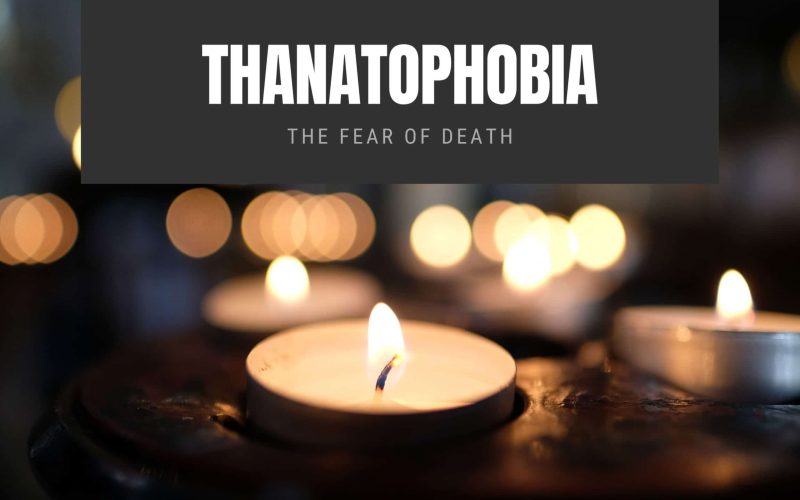Often, we hear people say that death is inevitable, and this is very true indeed. While we were younger, we learned that all life processes inevitably end in one place- death.
Although death is normal, many don’t want to ever think of the possibility. While some are conscious of the fact that someday they will die, others have irrational fears about it, and this irrational phobia is known as thanatophobia.
Thanatophobia is the fear of death or the fear of someone dying. Although most people think of death from time to time, people with thanatophobia think of death almost every other minute.
It is natural to worry about your health as you age; however, when you begin to worry about the process of dying or what happens after you are dead, although you are perfectly healthy, then you have thanatophobia.
The American Psychiatric Association(APA) recognizes thanatophobia as a common situation; however, they don’t consider this disorder as a mental condition. Instead, they think that this condition is related to an influx of excess anxiety.
Causes of Thanatophobia
Although the exact causes of thanatophobia are not known, experts have attributed the sources of this phobia to the following factors;
Genetics
Just like other phobias, one of the factors that are said to cause thanatophobia is genetics. Just like other numerous phobias, if you have any family member who has had any mental disorder or anxiety phobias, then you may likely develop thanatophobia.
It is important to note that although your family member had developed a particular phobia, for example, autophobia, in the past, it doesn’t mean that you will necessarily develop the same kind of anxiety disorder that he/she had.
Once you are genetically predisposed to developing an anxiety disorder(in this case, thanatophobia), all that is needed for you to start expressing the symptoms of this disorder is a trigger(otherwise known as environmental factors).
Environmental Factors
After becoming genetically predisposed to developing thanatophobia, any external cause, such as the trauma of losing a loved one to death or having someone or a pet die, can trigger the development of thanatophobia.
Religion
Religion has been seen to play a massive role in sharpening our lives and minds. According to research, it has been observed that one of the sources of the fear of death that many people experience can be traced directly to their religion.
Statistics show that about 80% of people who have thanatophobia complain that the result of their fear stems from their beliefs.
Most of the religions preach of life after death. Some people think they have an idea of what is going to happen after death; however, they still fear that they might find out that they are wrong.
Some people believe that the path that leads to salvation is very narrow, and as such, any mistake can result in them having eternal condemnation; this is their fear.
It is important to note that beliefs are highly personalized, and it is not always compulsory for the therapist to understand the beliefs of his clients. However, they are of the same religion.
Once a therapist establishes that the fear of death(thanatophobia) is directly linked to religion, he or she might require the patient to seek a form of counseling session with his/her spiritual guardian.
This form of counseling is known as supplemental counseling. It is vital to note that supplemental treatments should not be replaced with traditional medical counseling, which medical professionals can offer the patient.
Possible Reasons Why People Develop Thanatophobia
A person can develop Thanatophobia due to the following reasons;
Fear of the Unknown
One possible reason people develop thanatophobia is the fear of the unknown. Humans are naturally curious, and it is normal for them to want to understand what is happening around them and what the future holds.
Although according to some people, what happens in life is relatively predictable, however, no one knows what happens after death.
This fear of not knowing what can happen after death can lead to the development of thanatophobia.
Fear of Losing Control
Every human wants to feel a certain sense of control over what happens to them individually, their family, and their environment. However, it is impossible to have control over everything.
One thing you, as a person, can’t control is death. No one knows when he or she is going to die or how death will come.
As such, the fear of not being able to control death can make a person keep trying his/her best to keep death at bay.
Such a person would be seen to keep putting rigorous and sometimes extreme efforts in trying to have a grip, and as such, the person can develop thanatophobia.
Fear of Pain, Illness, and/or Loss of Dignity
According to psychologists and therapists, it has been discovered that those who appear to have this irrational fear of death don’t fear death; instead, they are often afraid of the numerous circumstances that are associated with death.
Quite often, people don’t die without pain. As such, those who appear to have thanatophobia are afraid of the excruciating pain, destabilizing illnesses as well as the associated loss of dignity that comes before death eventually arrives.
This type of fear often runs deep, and most times, it isn’t easily identified except through careful questioning.
People who have this fear have also been seen to develop certain disorders aside from thanatophobia.
These phobias include illness anxiety disorder, nosophobia, and some other somatoform disorders.
Fear of Abandoning Relatives
Thanatophobia is often seen to occur due to the intense fear of abandoning relatives and loved ones.
People who are afraid to die are mostly not afraid of death itself. Instead, along with their other many worries, they are scared of leaving loved ones and relatives broken and abandoned after they die.
Fear of Death in Children
Children generally lack the defense and coping mechanism of losing someone, and this is why when people die(especially their loved ones), they find it difficult to comprehend and come to terms with their death.
Hence a death of a loved one can destabilize a child and muddle up their thinking. This is why most people who have thanatophobia are often seen to have developed this fear from childhood.
For you to accurately diagnose a fear in children, it has to be present for 6 months or more.
Some children who have lost their loved ones, especially a parent or sibling, always find it challenging to get over their fears and pain.
Hence, the child may need to be monitored closely to look out for signs and symptoms that can depict thanatophobia.
Symptoms of Thanatophobia
Usually, a person who suffers from thanatophobia rarely shows symptoms. This is because their symptoms are not seen every time.
Some people who have thanatophobia are mostly normal; however, the situation changes immediately when they think of death or losing a loved one.
The general signs to note when trying to take note of a person who has thanatophobia include;
- Panic attacks that occur frequently
- Increased anxiety levels
- Dizziness
- Uncontrollable sweating
- Irregular heartbeats such as bradycardia or tachycardia
- Nausea and Vomiting.
- Severe stomach pain
- Increased sensitivity to temperatures
In some cases, you may experience worsening situations of thanatophobia. These situations may begin to affect you emotionally and psychologically. Once this occurs, you may start to experience symptoms such as;
- Sudden withdrawal and avoidance of friends and family members over an extended period
- Anger and uncontrollable outbursts
- Unexplainable sadness
- Intense feelings of guilt
- Uncontrollable agitation
- Persistent worry
Risk Factors Associated With Thanatophobia
Certain factors can increase your risk of developing this anxiety disorder. They include:
Genetics
Once you are genetically predisposed to getting any anxiety or mental disorder, then you are most likely to develop thanatophobia.
Once you have family members who had previously developed an anxiety disorder such as levophobia, autophobia, or any other phobia, including thanatophobia, or you have a relative who has developed a mental disorder such as schizophrenia, then you are genetically predisposed to developing thanatophobia.
Age
According to research, most individuals tend to think about death when they are in their 20s or early 30s. However, as they grow older, their thoughts on death seem to fade.
Gender
Although both males and females tend to think about death when they are in their 20s, when females get to 50 years and above, they tend to experience a secondary spike of thanatophobia.
People of Old Age
Research has suggested that people of younger ages experience thanatophobia more often than those who are in their older ages.
However, as people become older, they tend to start experiencing failing health and, as such, fear the dying process.
However, more than the older ones who are experiencing the dying process, their children tend to fear death more.
They are also more likely to say due to their feelings, their parents are afraid of dying. However, the reverse is the case.
Humility
People who are proud and live a fast-paced life are often more likely to worry deeply about how they will die.
More humble people tend to be more willing to give in to the death process and are more willing to accept how they would die.
As such, they will express less anxiety and have reduced chances of developing thanatophobia.
Health Issues
People with failing health and recurring death issues are more likely to experience greater levels of fear and anxiety when they think about their future. As such, they have higher chances of developing thanatophobia than those who are considered generally healthy.
Diagnosis of Thanatophobia
Since thanatophobia is not recognized as a clinical emergency, there are no physical tests available that help prove that a person has this disorder.
However, through the symptoms that you keep experiencing, your doctor can quickly narrow your condition and term it anxiety.
However, having a more in-depth conversation with your doctor will help your doctor note down your fears of death and the dying process.
While some people with symptoms of anxiety won’t always experience it or may experience it for six months, others can experience these symptoms constantly for more than six months.
The longer the duration of your symptoms, the higher your chances of being diagnosed with having a phobia.
Once your doctor discovers that you are dealing with a phobia, then he may refer you to a therapist, a psychologist, or a therapist for further diagnosis.
Treatment of Thanatophobia
The treatment for thanatophobia is often based on focusing on the fear and anxiety that is associated with this disorder and how to correct this disorder.
In treating this phobia, your doctor will prescribe the following treatment options:
Talk Therapy
Talking about your experiences with another person has provided a lot of relief. Who better to talk to than your therapist? Two types of therapy treatments are mostly used to treat phobias. They include:
Cognitive Behavioral Therapy
This therapy usually involves talking about your fears. Cognitive Behavioural Therapy (CBT) aims to help people who have thanatophobia understand why they act the way they do.
CBT focuses on helping you to create solutions to your phobias instead of avoiding it. It helps you to change how you think and also helps you understand that death is a normal phenomenon.
Exposure Therapy
Just like the name implies, exposure therapy has to do with the process by which your therapist gradually exposes you to your fear, and as such, you get used to it, and your phobia disappears.
According to research, scientists have proved that people who have thanatophobia have a high tendency to keep avoiding their fears, giving them a false sense of control over their phobias.
Meditation
Meditation, as well as breathing techniques, are one of the most effective ways a person can reduce the impact of anxiety and panic attacks anytime they occur.
The Use of Medications
Depending on how severe your fear is, your therapist may ask you to get certain medications.
Some drugs such as benzodiazepine, Klonopin , Xanax, Valium, and so on may be prescribed.
However, it is essential to note that these drugs can’t be used for an extended period.
This is because these drugs are very addictive, and when used in excess, these drugs have numerous side effects.
In conclusion, if you have any fears concerning death, and you are terrified that it is affecting your daily lifestyle as well as hindering your relationship with family and friends, then you should discuss with your doctor about your concerns.








